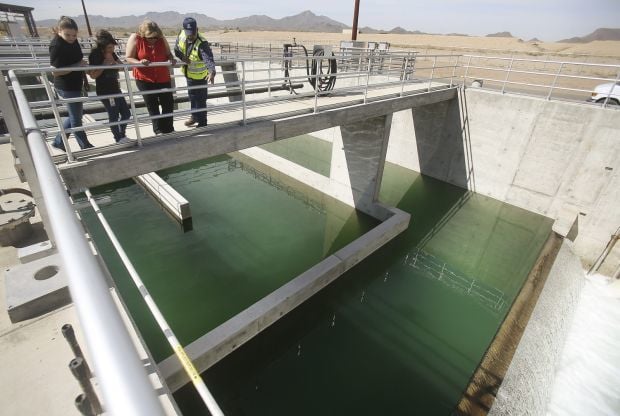While the exact course of action the Pima County supervisors unanimously approved Tuesday regarding a $2.7 million Davis-Monthan Air Force Base sewer bill is unclear, the legal advice they received suggests recouping all of it — or even a portion — would be an uphill battle.
After a half-hour executive session, the supervisors voted 4-1 to make a private legal memo from Deputy County Attorney Charles Wesselhoft public.
Supervisor Ally Miller objected, saying “I thought it was agreed we wouldn’t do that. Am I missing something?”
The central dispute — whether the connection fees are in fact a tax, which local governments can’t assess on federal agencies — would likely be won by the county because of a 2013 federal case, according to the memo, which the Star obtained through a records request.
But trying to win a sizable portion of the bill would likely be met with a number of potentially persuasive legal challenges by the base.
For one, prior to 2012 the county assessed connection fees, which are charged once on new development or significant improvements, based on the number of fixtures connecting to the sewer system. That methodology “may not meet the reasonableness test required to qualify as a fee,” the memo reads.
Additionally, the connection fee calculation adopted in 2012 is based on water meter size.
However, since the base gets much of its water from “onsite wells,” another method would be necessary to calculate “discharge potential” after that. Whatever method the county chooses would “likely be aggressively challenged” by the Air Force, though “connection fees due” between 2009 and 2012 are “potentially recoverable.”
And then there is the question of timing.
Contractual claims brought against the federal government have an “absolute” six-year statute of limitations, the clock on which may have started in 2005, 2009 or 2011, which was when the county sent the first invoice.
The base, however, “will undoubtedly” argue that the so-called “accrual date” occurred in 2005, when the county first notified the base of the issue, or 2009, when new construction since 1993 was first calculated. Both years would put any claim outside the six-year window.
The base “will argue that it is not obligated to pay any fees incurred prior to the accrual date and, for those fees incurred subsequent to the accrual date, it can pay only those fees that are reasonable,” the memo reads.
Between 1993 and 2009, the vast majority of new fixtures were added in or before 2004, according to county documents. From 1988 to 1993, the base paid roughly $75,000 in connection fees, and then abruptly stopped for unknown reasons. It has consistently paid user fees since 1988.
Wesselhoft’s memo also discusses options for assessing future connection fees now that there is a meter, installed at Air Force expense in collaboration with the county, that has been providing accurate readings for monthly user-fee billing since March 2016.
That data could be used to establish a “flow cap” that “could form the basis for future connection fees.”
Other county officials have expressed hope in such an approach, and the base previously said that the new meter “will allow us to accurately assess our impact to the wastewater treatment plant.”
Citing executive session rules, Supervisor Sharon Bronson declined to comment on the direction given to the attorney’s office in response to a question from the Star, but said the now-public memo “should give you some clue.”
Before voting, Supervisor Richard Elías said “this is a very difficult issue,” and added “that if these were residents of District 5 who refused to pay their connection fees, they’d probably get in a lot of trouble.”





